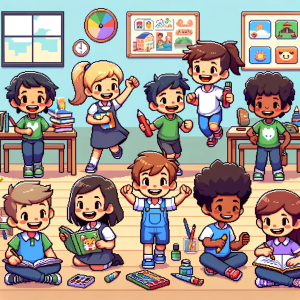
Enhancing Friendships in Children with Neurodevelopmental Needs: Insights from a Meta-Analysis
Navigating the world of friendships can be particularly challenging for children with neurodevelopmental disorders. A recent article titled “Friendship interventions for children with neurodevelopmental needs: A systematic review and meta-analysis” in PLoS ONE delves deep into the effectiveness of interventions aimed at improving the social connections of children with attention-deficit hyperactivity disorder (ADHD), autism, developmental language disorder (DLD), intellectual disability (ID), and social (pragmatic) communication disorder (SPCD). This comprehensive review brings hope and direction for school psychologists and anyone invested in the mental health of school-aged children.
Understanding Neurodevelopmental Disorders and Social Challenges
Children with neurodevelopmental disorders often face hurdles in social functioning due to differences in social, emotional, and cognitive skills. Traditional interventions have focused on specific aspects of social functioning, but there’s a growing realization of the importance of broader peer and friendship dynamics. The study methodically analyzes existing interventions, aiming to uncover strategies that effectively foster friendships and social inclusion for these children.
Key Findings from the Meta-Analysis
Out of numerous studies, 12 met the criteria for this review, involving 683 children with neurodevelopmental disorders. The findings were mixed yet insightful. Some interventions showed promise in enhancing social functioning and friendships, particularly those involving educators and actively engaging peers. Techniques that facilitated positive peer perceptions and provided support strategies were more effective. However, the overall pooled effect between intervention and control groups was insignificant, indicating the complex nature of positively influencing friendships.
Implications for School Psychologists and Educators
These findings emphasize the need for targeted, inclusive, and well-rounded intervention strategies for school psychologists, educators, and parents. The success of interventions depends heavily on their ability to address the specific needs of children, involve peers, and create a supportive environment. The role of educators is particularly highlighted as crucial in delivering and influencing the success of these interventions.
Future Directions and Considerations
The study calls for more comprehensive approaches to assess peer functioning and the inclusion of child self-report measures of friendship. It also highlights the need for longitudinal studies to evaluate the long-term impacts of these interventions. Importantly, while the study provides insights into ADHD and autism, there’s a gap in research for children with DLD, ID, and SPCD, pointing to an urgent need for more focused studies.
Conclusion
The article is a significant step in understanding and improving children’s social lives with neurodevelopmental disorders. It sheds light on the complexities of building friendships and the critical factors that can make interventions more effective. For school psychologists and those concerned about school mental health, this research underscores the importance of continued innovation, collaboration, and a holistic approach to supporting every child’s right to friendship and social well-being.



